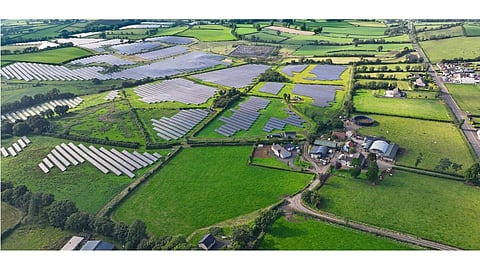

Northern Ireland plans CfD-style renewable auctions from 2027 to cut electricity costs and attract investment
The REPG scheme offers long-term contracts for solar, wind, and hybrid projects to boost renewable energy deployment
Technology-neutral auctions to include solar, onshore wind, and hybrid battery storage facilities
Northern Ireland’s Economy Minister, Dr. Caoimhe Archibald, has announced plans to introduce a contracts-for-difference (CfD) style renewable energy auction mechanism in this region of the UK. The inaugural auction round is expected to be launched in early 2027, aiming to lower electricity costs for consumers.
The Renewable Electricity Price Guarantee (REPG), the Final Scheme Design (FSD) for a renewable electricity support scheme, will position Northern Ireland as a competitive and attractive destination for investment, said the region’s Department for the Economy (DfE).
“Increasing investment in renewables is essential to reduce our reliance on high-cost fossil fuels and deliver on our net zero ambitions. The publication of the REPG Final Scheme Design will boost renewable generation and deliver lower electricity costs to households than they are paying today,” explained Archibald.
Eligible technologies under REPG include solar PV; onshore wind; solar PV and onshore wind; solar PV and battery; solar PV, onshore wind, and battery projects; and onshore wind and battery facilities. Projects must have a minimum capacity of 5 MW. There will be a single technology-neutral pot.
Existing projects can also be considered eligible if they are fully repowered at end-of-life. Winners will secure contracts for 15 years for a guaranteed strike price.
Selected projects will be required to come online within 2 years after contract signing, with provision to increase the timeline by a maximum of 1 year.
According to the auction roadmap, the 1st auction aims to procure 750 GWh to 1,250 GWh annually. However, to achieve the target 80% share of renewable energy in the overall electricity consumption by 2030 requires another auction with a procurement volume of 3,250 GWh to 3,750 GWh, says DfE, but details will be released later.
It will also explore the feasibility of introducing the approach of mandatory discounted electricity bills for households located near REPG-supported projects. In future iterations of the auction process, the distributed generation segment may also be included.
The FSD has been tailored to fit the all-island Single Electricity market, a wholesale electricity market that enables power trade between Northern Ireland and the Republic of Ireland.
REPG is designed to incentivize the deployment of renewable generation at the most affordable price for consumers; however, the government recognizes that achieving the 2030 target will depend on the availability of a sufficient pipeline of renewable projects and the development of electricity infrastructure to support additional generation.
The scheme is modeled after the existing CfD scheme in Britain and the Renewable Energy Support Scheme in Ireland (see UK Opens Bid Window For CfD Under Allocation Round 7 and Aurora Forecasts Challenges For Ireland’s RESS 5 Auction).
RenewableNI, the industry’s renewable energy association, has welcomed the support scheme, saying it provides wind and solar farm operators with long-term price certainty.
“It is one of, if not the, most directly beneficial actions the Executive has taken to power economic growth here, particularly in rural areas,” said RenewableNI Chair Tamasin Fraser. “Issues such as grid constraints, planning system delays and the lack of a policy framework for long duration energy storage also need to be urgently addressed as well as support for small projects which can make a mighty difference to our green economy.”
DfE says it will invite feedback on the REPG terms and conditions later this year.
